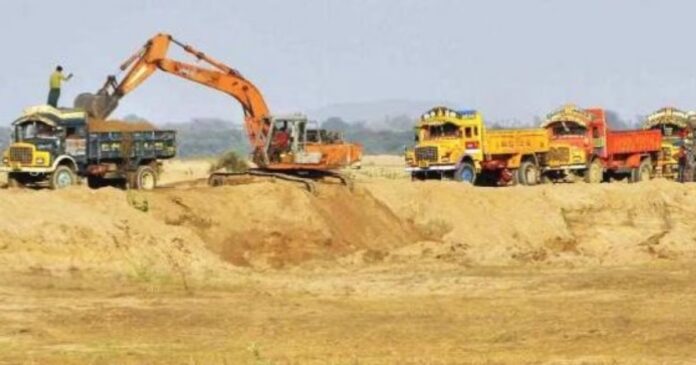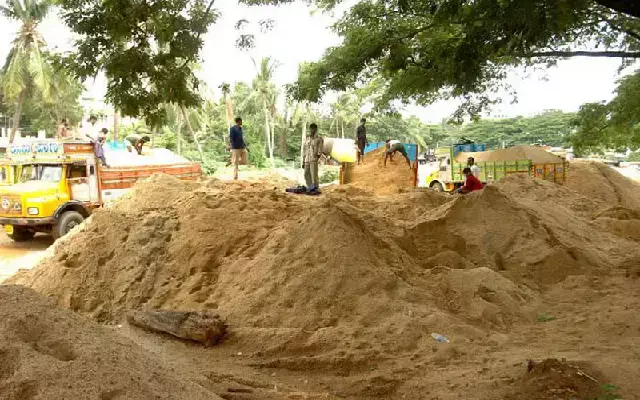Illegal Sand Transportation: Coastal Karnataka, including districts such as Dakshina Kannada, Udupi, and Uttar Kannada, has reported a dramatic rise in illegal sand transportation cases over the last three years. This alarming trend highlights growing environmental concerns and the challenges authorities face in tackling the sand mafia. The numbers have jumped from 32 cases in 2022 to 228 in 2024, with Dakshina Kannada witnessing the highest number of incidents.
Why Illegal Sand Transportation Is Escalating?
The rise in illegal sand transportation in Karnataka is linked to multiple factors:
- High Demand For Sand:
- The rapid pace of urbanization and infrastructure projects has led to a surge in demand for sand, a key construction material.
- Natural sand, preferred for its quality, is overexploited, especially in coastal regions.
- Weak Regulatory Framework:
- Loopholes in the existing legal framework make it difficult to monitor and regulate sand mining effectively.
- Corruption and collusion between officials and sand mafias further exacerbate the issue.
- Organized Sand Mafias:
- Sand mining has become a highly lucrative but illegal business, with organized mafias controlling the supply chain.
District-Wise Impact Of Illegal Sand Transportation
The problem is not uniform across the state, with some districts bearing the brunt more than others:
- Dakshina Kannada:
- The district reported 111 cases in 2024, with 53 of them occurring within Mangaluru city limits.
- The Nethravathi River and its tributaries are hotspots for illegal sand extraction.
- Udupi And Uttar Kannada:
- Both districts have seen a steady increase in cases, though the scale is smaller compared to Dakshina Kannada.
- Impact On Local Communities:
- Villagers living along riverbanks report worsening erosion and reduced water availability.
Environmental Consequences Of Illegal Sand Mining
The unchecked rise in illegal sand transportation has severe ecological impacts:
- River Ecosystem Disruption:
- Overextraction of sand destabilizes riverbeds, affecting aquatic life and water flow.
- It accelerates erosion, weakening riverbanks and increasing flood risks.
- Groundwater Depletion:
- Sand plays a critical role in maintaining groundwater levels.
- Excessive mining disrupts this balance, leading to reduced groundwater availability.
- Loss Of Biodiversity:
- The destruction of habitats along riverbanks adversely affects flora and fauna, particularly species dependent on the river ecosystem.
Government’s Measures To Curb Illegal Sand Transportation
Authorities in Karnataka have taken several steps to address the issue, though challenges persist:
- Increased Surveillance:
- District administrations have deployed flying squads to monitor and raid illegal sand mining sites.
- Surveillance drones are being used in some areas to detect unauthorized activities.
- Revised Penalties:
- Fines for illegal sand transportation have been increased to deter offenders.
- Repeat offenders face harsher punishments, including imprisonment.
- Public Awareness Campaigns:
- Efforts are underway to educate communities about the importance of sustainable sand mining.
- Digital Permits:
- Karnataka has introduced a system for issuing digital permits for sand transportation, improving transparency and reducing fraud.
Role Of Technology In Addressing The Crisis
Technology is playing an increasingly critical role in combating illegal sand mining:
- GPS Tracking:
- Vehicles transporting sand are being equipped with GPS devices to monitor their movements.
- Drone Surveillance:
- Drones are used to patrol riverbanks and detect unauthorized mining activities.
- Data Analytics:
- Advanced data analytics help identify patterns in illegal mining activities, enabling targeted enforcement.
Historical Context Of Sand Mining In Karnataka
The history of sand mining in Karnataka reveals how the industry has evolved over the years:
- Traditional Practices:
- In the past, sand mining was carried out on a small scale, primarily to meet local construction needs.
- Industrial Boom:
- Economic liberalization in the 1990s led to rapid urbanization, increasing demand for sand and attracting organized mafias.
- Emergence Of Regulations:
- The Karnataka Minor Mineral Concession Rules were introduced to regulate sand mining, but enforcement remains weak.
Challenges In Tackling Illegal Sand Transportation
Despite government efforts, several challenges hinder progress:
- Corruption And Collusion:
- Allegations of corruption within law enforcement and local administration undermine anti-mining efforts.
- High Profit Margins:
- The lucrative nature of illegal sand mining attracts powerful entities willing to bypass regulations.
- Limited Resources:
- Enforcement agencies often lack the manpower and equipment needed for effective monitoring.
- Resistance From Local Communities:
- In some cases, locals involved in small-scale mining resist government intervention, citing livelihood concerns.
Impact On Local Livelihoods And Economy
The rise in illegal sand transportation affects more than just the environment:
- Displacement Of Communities:
- Erosion caused by sand mining forces families to abandon their homes near riverbanks.
- Economic Losses:
- The state loses significant revenue due to illegal mining, impacting funds for development projects.
- Job Opportunities:
- While illegal mining creates jobs, these are often exploitative and lack legal protections.
The Way Forward
Addressing the issue of illegal sand transportation requires a multi-faceted approach:
- Strengthening Enforcement:
- Better coordination between local authorities and state agencies can enhance monitoring efforts.
- Sustainable Alternatives:
- Promoting alternatives like manufactured sand can reduce dependence on river sand.
- Empowering Communities:
- Involving local communities in monitoring and reporting illegal activities can improve enforcement.
The alarming rise in illegal sand transportation in Karnataka is a wake-up call for all stakeholders. With concerted efforts from the government, law enforcement, and citizens, it is possible to curb this menace and ensure the sustainable use of natural resources.



